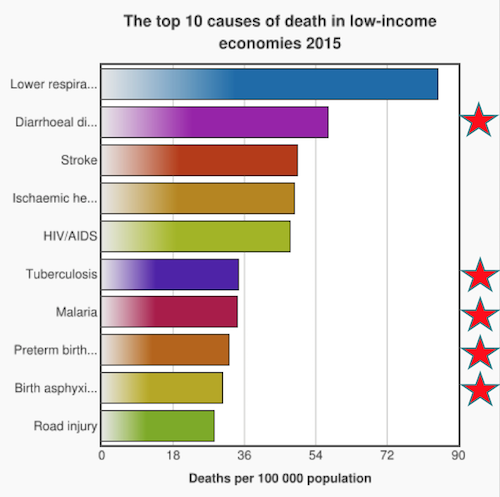Few things are more exciting than saving the world. James Bond and Superman have done it. Now, Facebook founder Mark Zuckerberg and his wife Priscilla Chan want to do it, too. It's a sufficiently sizable goal for a couple with a sufficiently sizable ego. And their goal will be best accomplished by spending their money on boring stuff.
The duo (Z-Chan? Chuckerberg?) recently announced their intention to "cure, prevent or manage all disease within our children's lifetime." But according to Nature News, the first grants will be awarded to "risky ideas," such as "the genomics of obscure microbes to a memory-retrieval device."
This is a mistake. If prevention and management of disease really are important to Mr. Zuckerberg and Mrs. Chan, then perhaps their initial funds ought to be aimed at fighting the underlying cause of so much suffering in the world: poverty.
Consider the top ten causes of death among low-income countries, according to the World Health Organization*:

Five of the top ten causes of death (marked by red stars) essentially do not occur in rich countries: Diarrhea, tuberculosis, malaria, preterm birth complications, and birth asphyxia/birth trauma. Lack of basic infrastructure, such as electricity, and adequate public health services are largely to blame. Placing resources toward solving these problems would yield a large return on investment.
Nearly six million children under the age of five died in 2015, almost half of which were linked to malnutrition. (Being malnourished makes children more susceptible to death from infectious disease, for instance.) Ensuring that every child in the world consumes clean food and water and receives appropriate vaccines would literally save millions of lives.
To be sure, curing Alzheimer's or cancer would also save millions of lives. But these diseases are much more difficult (if not impossible) to cure, and they mainly affect older people. If given the option of saving either a 5-year-old child from diarrhea or an 80-year-old man from Alzheimer's, the choice is obvious. That may sound cold, but such decisions must be made in a world of finite resources.
Of course, Mr. Zuckerberg and Mrs. Chan likely would respond that they want to "cure all disease." That is egotistical nonsense. Curing dementia might bring them fame and glory, but giving sub-Saharan African or southeast Asian children a chance at life would make them unsung heroes. Moreover, the former is far from assured, while the latter is much more achievable.
Though it won't be the subject of a blockbuster movie, investing in boring stuff almost always has the greatest and most immediate impact on humanity. Leave the unlikely acts of heroism to the screenwriters.




